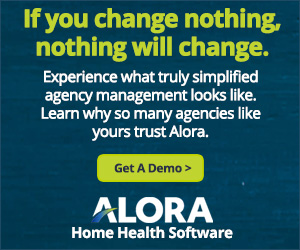
16 Oct Shifting from Caregiver to CEO of a Homecare Agency
Being a Great Caregiver Doesn’t Always Equate to Running a Successful Home Health Agency
Life is full of change. A move from caregiver to chief executive officer (CEO) of a home health agency requires the adoption of new skills for success. The key to a smooth transition is to capitalize on transferrable skills and diligently work on areas of improvement.
The strengths of a good caregiver greatly benefit leadership operations of a home health agency. These commonly include empathy, patience, listening skills, communication skills, trust, flexibility and dependability. Caregivers are also well positioned to lead organizations due to their ability to work in teams, manage difficult and high stress situations, advocate for clients, multitask while displaying a professional demeanor and remain steadfast to values. While the laundry list of common caregiver traits does not speak to everyone, it does emphasize a few general areas that could be potential pitfalls of running a successful agency.
A Different Lens
Clients are at the heart of any home health agency and a caregiver’s primary focus is on one party. Leadership within a successful home health agency will include a broader understanding of internal and external stakeholders, their potential conflicting needs and how they integrate with overall agency operations. Primary stakeholders in health care include Policymakers, Payors, Providers and Patients (The 4P’s). Conversations need to be had with each party to clearly outline their needs and expectations from the agency and leaders must understand big picture perspectives. For example, it should be well understood how policy regulates coverage of care and reimbursement for payors. Further, clients need to become healthier through what is deemed medically necessary care while not incurring a financial hardship for their health burdens. The agency tracks their record of improving health in accordance with determined quality indicators while simultaneously being evaluated by their consumers. This simplified overview is a lot to think about for one person, however, understanding all the dynamics between healthcare stakeholders, the “4 P’s”, is essential to any compliant and successful home health agency. The caregiver who becomes a CEO must move their familiarity from patient to a systems level of understanding. Creating a visual board or grid can articulate an easy-to-understand format to display the essential goals and interests of each stakeholder.
Formal caregiving education does not focus on training for business ownership. Training for nursing at the aide and associate levels is delivered to guide the individual to pass a benchmark licensure exams to demonstrate the skills and abilities related to being a caregiver. It is not until the bachelor’s or higher education levels of nursing where the topics of leadership, management and public health are minimally explored. Unless an individual deviates to a management or business focus in education, caregivers cannot rely on their educational backgrounds solely to become successful home health agency owners. Education and experience needs to align with the topics of leadership, entrepreneurship and healthcare regulation. The Small Business Administration has a wide range of help such as counseling, webinars and guides to support a business through the stages of just an idea to expansion and growth. The National Association for Home Care and Hospice also has a page dedicated to providing resources for providers offering skilled and non-skilled services in home health.
Making a Successful Home Health Care Career Shift
Though a home health agency CEO will shift their mindset to understanding operations of health care delivery, they are also expected to adhere to the exhaustively detailed and frequently changing rules for lawful operation and reimbursement. This can be the one area that inhibits an individual from starting an agency in the first place. The best advice to stay on top of regulation is to seek help. Support is available from national organizations, regulatory consultants, and may also be found within your state’s department of health. The National Association for Homecare and Hospice (NAHC), for example, has a 12-month mentorship program focused to support emerging leaders in the industry. Those enrolled as mentees can directly network with industry experts for advice and assistance to foster organizational excellence. The Health Care Compliance Association also offers support for understanding regulatory matters within the home health sector. A variety of webinars, conferences, books and training materials are available to business owners through membership. Many state home care organizations also offer educational sessions, workgroup committees and other regional community resources for home health agency owners.
Build Leadership Skills
Nurses have an oath to protect patients from harm and provide care consistent with a list of ethical values. A recent study presented in the Journal of Nursing Management reports nurse entrepreneurs may lack leadership confidence and support in starting their own agency as they evaluate the ethics of doing so. Peers may question their career move and the evidence suggests nurses may feel they are betraying their “true calling” of patient care. Further, nurses may be concerned about potentially placing patients in harm as they are sorting out all the moving parts of starting and growing a home health agency. Surround yourself with like-minded individuals and other agency leaders who you can learn from and lean on. Implement tools that assist with process management like home care software and work productivity applications. Having a support system that acknowledges and understands the challenges with being a CEO can help you re-energize, improve focus and dig deep to cultivate motivation to move from giving up to growing success.
Starting a business requires grit; determination, perseverance and the ability to stay passionate despite the ups and downs of ownership. Nurses and caregivers that decide to take the role of home health agency CEO can build their leadership confidence by reminding themselves of the value they desire to add to the industry and take some advice from famous author James Clear on How to be Mentally Tough:
- Define long term goals clearly.
- Build small wins.
- Be consistent in your habits.
The process applied for the home health agency CEO could be:
- Identifying long-term goals such as what value your agency adds to your client’s lives and communities.
- Identifying steps to reach long-term goals and celebrating small successes to create momentum. This may include expanding into a new market, hiring a new staff member, offering a new service, identifying a way to streamline homecare workflow and operations through use of technology to improve compliance rates, seeing a rise in client satisfaction scores, and more. The list of possibilities is endless.
- Executing what other successful CEOs of homecare agencies do daily such as focusing on productivity vs. being “busy”, communicating often with your team, and staying up to date on the industry. If a short-term goal is to offer a new service, create a daily checklist with a few simple “to-do” items that will slowly but surely get you there.
Being the CEO of a home health agency is demanding for anyone despite their background. Caregivers have a great foundational skillset for leading a successful organization and may find some of the tools and suggestions presented helpful to fill in any gaps.
Resources/References:
- Small Business Administration
- National Association for Home Care and Hospice
- 12-month mentorship program info- NAHC
- Health Care Compliance Association
- Journal of Nursing Management
Author’s Note: Views, information, and guidance in this resource are intended for information only. We are not rendering legal, financial, accounting, medical, or other professional advice. Alora disclaims any liability to any third party and cannot make any guarantee related to the content.
Additional related blogs:

Alora’s home health software solution is ideal for agencies operating in both skilled and non-skilled care. Managing workflow for administrative and caregiving staff becomes easier with the right technology tools. Alora has been engineered with the goal of simplification of day-to-day tasks in the office and in the field, allowing agencies to focus on patient care, workflow efficiency, and growth.



No Comments